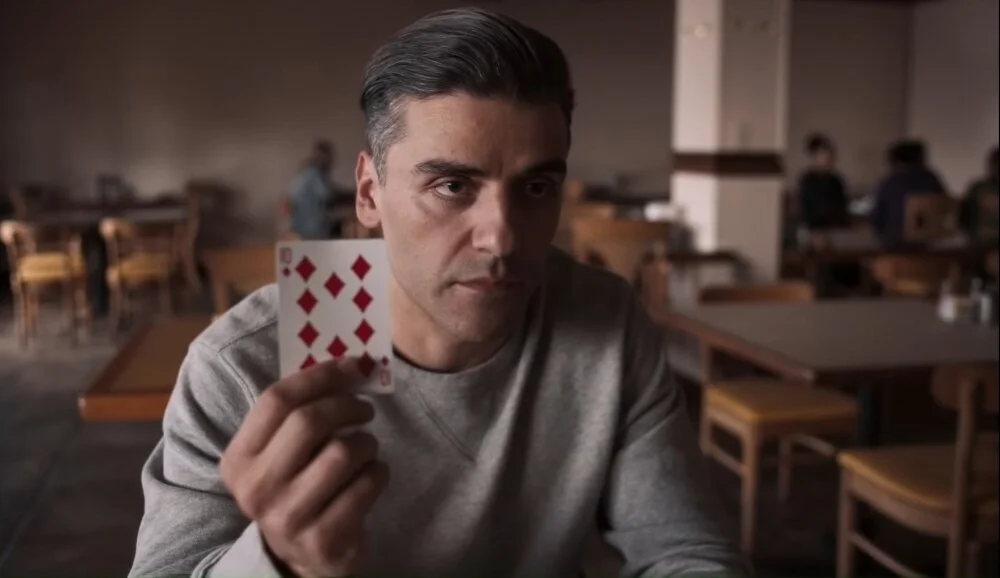THE CARD COUNTER
Directing: B
Acting: B
Writing: A-
Cinematography: B+
Editing: B-
The Card Counter is . . . different. Sometimes that’s a genuine strength to a film; sometimes it’s just a neutral fact about it, and I would argue this film falls in the latter category. Thus, it becomes another one of those movies with wide critical acclaim where I watch it and then think, okay, sure, I guess. I understand the critical claim, and also understand why it won’t go far with general audiences.
Take the title, for instance. In the first half of the film, the title character, William Tell (Oscar Isaac), spends a lot of time in voiceover narration, telling us not so much how counting cards works, but how it works for him. We spend a lot of time in casinos, watching him work, aiming for what he calls “modest goals”—he explains that casinos don’t mind card counters, as long as they don’t win too big too often. When asked why he spends his days doing this and virtually nothing else, Tell replies, “It passes the time.”
I could say the exact same thing about how much time I spend going to the movies, and often seeing movies like this one. There’s no better explanation than “It passes the time.” It’s neither particularly painful nor particularly rewarding. I mean, don’t get me wrong; I do have genuine passion for film, and for writing about film. But that passion cannot run at a consistent level of intensity, and it never has. My only point is, I get it.
That’s about as far as my empathy goes, however, because as the film goes on, we learn that card playing in often low-rent, out-of-the-way casinos across the country is just a way to fill the emptiness of Tell’s life, a distraction from his heavy guilt, having been a participant in the abuses documented at Abu Ghraib. He was sentenced to ten years in prison, served eight and a half, and it was in that time he taught himself how to count cards. He had the time, he practiced until he was damned near perfect.
And, the title notwithstanding, The Card Counter is far more about a man reckoning with past sins than it has anything to do with card playing, really. The cards is just the easy self-distraction. Except, Tell comes across distractions in two other human forms: La Linda (Tiffany Haddish, very well cast in an unusual role), the woman who runs “a stable” of gamblers who play with investors’ money and recruits Tell; and the real turning point in Tell’s life, a young man named Cirk (Tye Sheridan). Cirk is the son of another veteran of Abu Ghraib whose tortured memories of what he did ultimately led him to commit suicide; Cirk happens to be at a seminar where a Sergeant from Abu Ghraib (Willem Dafoe) is speaking, and he recognizes Tell.
Cirk plainly naive from the start, with an asinine plan to capture Sergeant Gordo, torture him the way they did the prisoners at Abu Ghraib, and kill him. Tell takes a liking to him, and takes him on as a new sense of purpose in his life, intent on helping him settle his college debts and reunite with his estranged mother. This is the bulk of the story in The Card Counter, Tell having invited Cirk to ride with him from tournament to tournament, his expenses paid, ostensibly just to keep him company but having no idea Tell is just saving up his winnings to give to him.
All of this is done with mostly deadpan delivery, something that happens a lot in movies with wide critical acclaim but which I find strangely divorced from realism. Writer-director Paul Schrader is clearly going for, and achieving, a particular tone, but it’s just as muted as the lighting in all these second-tier casinos. It’s easy to imagine a lot of viewers being bored by this movie, even though I found it to be quite unusually well written—the only especially impressive element of its production. Often it’s the other way around, movies with great acting and great cinematography but a crap script. I guess you could say this one flips that script.
I was compelled by it for that very reason, but I’m not especially convinced that you will be, unless you’re an intermittently pretentious film snob like I am. And hey, if you’ve made it this far in this very review, maybe you are!
Schrader goes out of his way to note, in this movie, how the only people at Abu Ghraib who were convicted were the ones in published photographs. This is the injustice that Cirk is convinced he’s crusading to justify: that none of those people’s superiors were held accountable, and instead got to go on with diversified and lucrative careers. We are subject to some flashbacks to Abu Ghraib, which are mercifully few and fairly brief. In these scenes, I found myself thinking about casting. It’s nice to see Tiffany Haddish in such an unusual role as a Black woman; I wish I could say the same for the several actors depicting the Abu Ghraib prisoners, who likely still get saddled with virtually nothing but roles like these. And here they’re just extras: no lines, so nowhere near the same pay scale.
If nothing else, The Card Counter is a fascinating contemplation of moral complexity. Any kind of easy entertainment, it certainly is not—but it has its own certain value.
Well that’s eight down, I guess.
Overall: B

